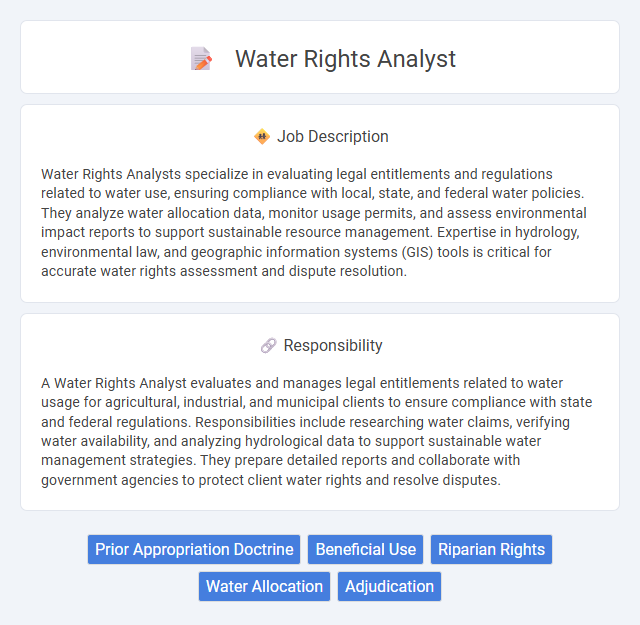
Water Rights Analysts specialize in evaluating legal entitlements and regulations related to water use, ensuring compliance with local, state, and federal water policies. They analyze water allocation data, monitor usage permits, and assess environmental impact reports to support sustainable resource management. Expertise in hydrology, environmental law, and geographic information systems (GIS) tools is critical for accurate water rights assessment and dispute resolution.
Individuals with strong analytical skills and a passion for environmental law are likely to be well-suited for a Water Rights Analyst role. Those comfortable interpreting legal documents and managing complex data sets might find this job fulfilling. Candidates lacking attention to detail or an interest in regulatory compliance may struggle to thrive in this position.
Qualification
Water Rights Analyst roles require a strong background in environmental science, hydrology, or water resource management, often supported by a bachelor's or master's degree in these fields. Candidates must possess expertise in water law, regulatory frameworks, and data analysis, with proficiency in GIS software and water rights databases being highly valuable. Effective communication skills are essential for drafting legal documents, preparing reports, and collaborating with stakeholders to ensure compliance and sustainable water use.
Responsibility
A Water Rights Analyst evaluates and manages legal entitlements related to water usage for agricultural, industrial, and municipal clients to ensure compliance with state and federal regulations. Responsibilities include researching water claims, verifying water availability, and analyzing hydrological data to support sustainable water management strategies. They prepare detailed reports and collaborate with government agencies to protect client water rights and resolve disputes.
Benefit
Water Rights Analysts likely gain valuable expertise in water law and resource management, enhancing their career prospects in environmental and regulatory sectors. They probably benefit from opportunities to influence sustainable water use policies and collaborate with government agencies, legal teams, and environmental organizations. Strong analytical skills developed in this role may increase their value in consulting and policy development industries.
Challenge
The role of a Water Rights Analyst likely involves navigating complex legal frameworks and regulatory environments, posing significant challenges in ensuring compliance and accurate water allocation. There is a probability that analysts must interpret ambiguous water rights laws while balancing competing stakeholder interests under evolving environmental conditions. Managing data uncertainty and predicting the impact of policy changes on water distribution could further complicate decision-making in this position.
Career Advancement
A Water Rights Analyst specializes in assessing, managing, and securing water usage entitlements, ensuring compliance with regulatory frameworks and optimizing resource allocation for sustainable development. This role offers significant career advancement opportunities through progression to senior analyst, water resource manager, or environmental consultant positions, leveraging expertise in hydrology, environmental law, and data analysis. Developing skills in geographic information systems (GIS), policy interpretation, and stakeholder negotiation can further enhance upward mobility in government agencies, environmental firms, or water utility companies.
Key Terms
Prior Appropriation Doctrine
A Water Rights Analyst specializing in the Prior Appropriation Doctrine evaluates water use based on the principle of "first in time, first in right," ensuring senior water rights holders maintain priority during water allocation, especially in arid regions of the western United States. This role involves analyzing historical water permits, legal agreements, and state water codes to resolve conflicts and support sustainable water resource management. Expertise in hydrology, water law, and regulatory frameworks is essential to accurately assess and protect water entitlements under this doctrine.
Beneficial Use
A Water Rights Analyst evaluates water usage to ensure compliance with legal frameworks governing beneficial use, a key principle optimizing water resource allocation. They assess historical water data, enforce regulations that prevent waste or diversion, and support fair distribution among agricultural, industrial, and municipal sectors. Mastery of hydrological data interpretation and water law is essential for safeguarding sustainable water rights and promoting efficient water management.
Riparian Rights
Water Rights Analysts specializing in Riparian Rights evaluate legal entitlements allowing landowners adjacent to water bodies to reasonably use water resources. Their expertise includes interpreting state and federal regulations, managing water allocation conflicts, and assessing environmental impacts on riparian water flow. Proficiency in hydrological data analysis and water law statutes ensures accurate evaluation of water use compliance and sustainable resource management.
Water Allocation
Water Rights Analysts specialize in evaluating and managing water allocation to ensure legal compliance and optimize resource distribution among agricultural, industrial, and municipal stakeholders. They analyze hydrological data, water usage permits, and regulatory frameworks to support sustainable water management practices. Expertise in state and federal water rights laws is critical for resolving conflicts and advising policy development.
Adjudication
A Water Rights Analyst specializing in adjudication conducts detailed analysis of legal claims related to water entitlements under state and federal laws. They review historical water use data, survey reports, and legal documents to support court proceedings that determine water rights ownership and usage priorities. Expertise in hydrology, property law, and regulatory compliance is crucial for accurately assessing and quantifying water rights during adjudication processes.
 kuljobs.com
kuljobs.com